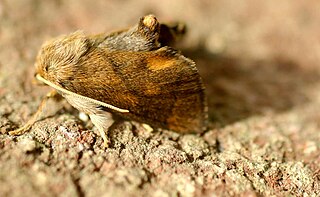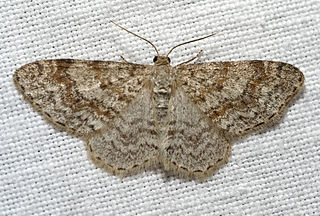Related Research Articles

Borneo is the third-largest island in the world and the largest in Asia. At the geographic centre of Maritime Southeast Asia, in relation to major Indonesian islands, it is located north of Java, west of Sulawesi, and east of Sumatra.

The flannel moths or crinkled flannel moths are a family of insects. They occur in North America and the New World tropics. The larvae are called puss caterpillars, and with their long hairs, resemble cotton balls. They have venomous spines that can cause a painful sting and inflammation lasting for several days. In some cases, the sting may cause headache, nausea, and shock-like symptoms. Perhaps the most notorious for stinging is the caterpillar of Megalopyge opercularis.

The Drepanidae is a family of moths with about 660 species described worldwide. They are generally divided in three subfamilies which share the same type of hearing organ. Thyatirinae, previously often placed in their own family, bear a superficial resemblance to Noctuidae. Many species in the Drepanid family have a distinctively hook-shaped apex to the forewing, leading to their common name of hook-tips.

Endoclita is a genus of moths of the family Hepialidae. There are 60 described species found in eastern and southeast Asia and the Indian subcontinent.

The Limacodidae or Eucleidae are a family of moths in the superfamily Zygaenoidea or the Cossoidea; the placement is in dispute. They are often called slug moths because their caterpillars bear a distinct resemblance to slugs. They are also called cup moths because of the shape of their cocoons.

Callidulidae, the only known family of the superfamily Calliduloidea, is the family of Old World butterfly-moths, containing eight genera. They have a peculiar distribution, restricted to the Old World tropics of South East Asia to Australasia and Madagascar. The three subfamilies exhibit both day- and night-flying behaviour.
Mantala is a monotypic moth genus in the subfamily Arctiinae. Its single species, Mantala tineoides, is found on Borneo. Both the genus and the species were first described by Francis Walker in 1862. The habitat consists of lowland and lower montane forests.

Ugia is a genus of moths in the family Erebidae erected by Francis Walker in 1858.
Hypenagonia is a genus of moths of the family Erebidae first described by George Hampson in 1893. The adult moths have pale brown wings with a dark band across each wing. The wingspan of these moths is about 1 centimeter.
Idiochlora is a genus of moths in the family Geometridae. The genus was described by Warren in 1896.

Ozola is a genus of moths in the family Geometridae first described by Francis Walker in 1861.

Asthenini is a tribe of geometer moths under subfamily Larentiinae first described by Warren in 1893. The tribe has been combined with Eupitheciini in the past, most notably by Jeremy Daniel Holloway in his work The Moths of Borneo.

Eupitheciini is a tribe of geometer moths under subfamily Larentiinae, often referred to as pugs. The tribe was described by Tutt in 1896.

Lymantriini is a tribe of moths of the family Erebidae. This tribe is a group of polyphagous moths that reside mostly in the tropical regions of Afro-Eurasia but also North America.
The Catephiini are a tribe of moths in the family Erebidae.
Onagrodes victoria is a moth in the family Geometridae. It is found in southern Myanmar and on Borneo.
Onagrodes recurva is a moth in the family Geometridae. It is found on Seram and on New Guinea.
Onagrodes eucineta is a moth in the family Geometridae. It is found on Peninsular Malaysia and Borneo.
Onagrodes barbarula is a moth in the family Geometridae. It is found on New Ireland.
References
- ↑ Yu, Dicky Sick Ki (1997–2012). "Onagrodes Warren 1896". Home of Ichneumonoidea. Taxapad. Archived from the original on August 13, 2017.
- ↑ Holloway, Jeremy Daniel. "Onagrodes oosyndica Prout". The Moths of Borneo. Retrieved March 9, 2019.
| Wikimedia Commons has media related to Onagrodes oosyndica . |
| Wikispecies has information related to Onagrodes oosyndica |
| This Eupitheciini moth related article is a stub. You can help Wikipedia by expanding it. |